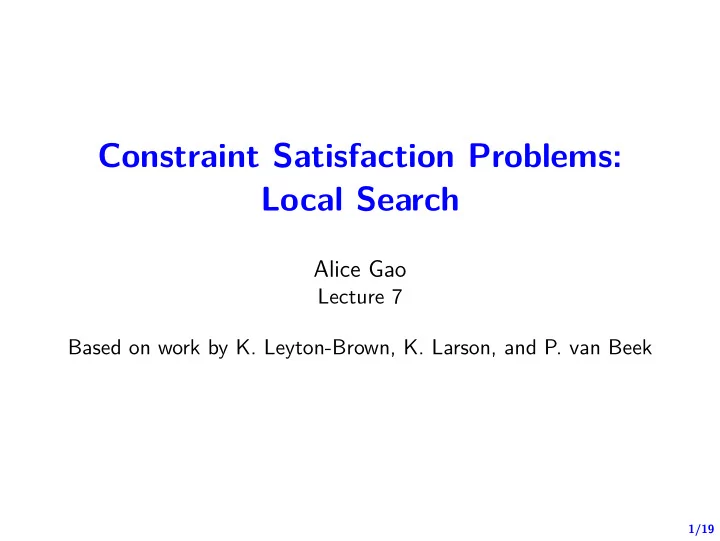

1/19 Constraint Satisfaction Problems: Local Search Alice Gao Lecture 7 Based on work by K. Leyton-Brown, K. Larson, and P. van Beek
2/19 Outline Learning Goals Introduction to Local Search Local Search Algorithms Hill climbing Revisiting the Learning goals
3/19 Learning Goals By the end of the lecture, you should be able to algorithms. using complete-state formulations. optimum. ▶ Describe the advantages of local search over other search ▶ Formulate a real world problem as a local search problem ▶ Given a local search problem, verify whether a state is a local
4/19 Why Use Local Search? goal is irrelevant. ▶ Many search spaces are too big for systematic search. ▶ For CSPs, we only need to fjnd a goal node. The path to a ▶ Solution: local search
5/19 What is local search? of values to variables. neighbour is. ▶ Keep track of a single node, which is a complete assignment ▶ Move to a neighbour of the node based on how good the
6/19 When should we use local search? but no goal test. ▶ The state space is large or infjnite. ▶ Memory is limited. ▶ To solve pure optimization problems with a fjtness function
7/19 Local Search For solving a CSP, a local search problem consists of a: a complete assignment to all of the variables. direction should we go? ▶ A set of variables ▶ Domains for the variables ▶ Constraints on the joint values of the variables ▶ A node in the search space is ▶ A neighbour relation: which nodes do I explore next? ▶ A cost function: how good is each assignment? In which
8/19 Example: 4-Queens Problem
9/19 Example: Traveling Salesperson Problem
10/19 Learning Goals Introduction to Local Search Local Search Algorithms Hill climbing Revisiting the Learning goals
11/19 Questions The problem formulation: Executing the algorithm: Properties and performance of the algorithm: the global optimum solution? ▶ What is the neighbour relation? ▶ What is the cost function? ▶ Where do we start? ▶ Which neighbour do we move to? ▶ When do we stop? ▶ Given enough time, will the algorithm fjnd ▶ How much memory does it require? ▶ How does the algorithm perform in practice?
12/19 Hill climbing Start with a random or good solution. Move to a neighbour with the lowest cost. Break ties randomly. Greedy: does not look ahead beyond one step. Stop when no neighbour has a lower cost. Only need to remember the current node. No memory of where we’ve been. ▶ Where do we start? ▶ Which neighbour do we move to? ▶ When do we stop? ▶ How much memory does it require?
13/19 Hill climbing in one sentence Climbing Mount Everest in a thick fog with amnesia
14/19 CQ: Will hill climbing fjnd the global optimum? CQ: Will hill climbing fjnd the global optimal solution given enough time? (A) Yes. Given enough time, hill climbing will fjnd the global optimal solution for every problem. (B) No. There are problems where hill climbing will NOT fjnd the global optimal solution.
15/19 Dealing with plateaux Tabu search: keep a small list of recently visited states and forbid the algorithm to return to those states. ▶ Allow sideway moves to escape a shoulder. ▶ An infjnite loop when we are on a fmat local optimum. ▶ Limit the number of consecutive sideway moves.
16/19 CQ: Is this state a local optimum? CQ: Consider the following state of the 4-queens problem. Consider successor function B: swap the row positions of two queens. Is this state a local optimum? Q Q Q Q (A) Yes (B) No (C) I don’t know.
17/19 CQ: Is this state a local optimum? CQ: Consider the following state of the 4-queens problem. Suppose that we use successor function A: move a single queen to another square in the same column. Is this state a local optimum? Q Q Q Q (A) Yes (B) No (C) I don’t know.
18/19 Choosing the Neighbour Relation How do we choose the neighbour relation? ▶ Small incremental change to the variable assignment There’s a trade-ofg: ▶ bigger neighbourhoods: ▶ smaller neighbourhoods:
19/19 Revisiting the Learning Goals By the end of the lecture, you should be able to algorithms. using complete-state formulations. optimum. ▶ Describe the advantages of local search over other search ▶ Formulate a real world problem as a local search problem ▶ Given a local search problem, verify whether a state is a local
Recommend
More recommend